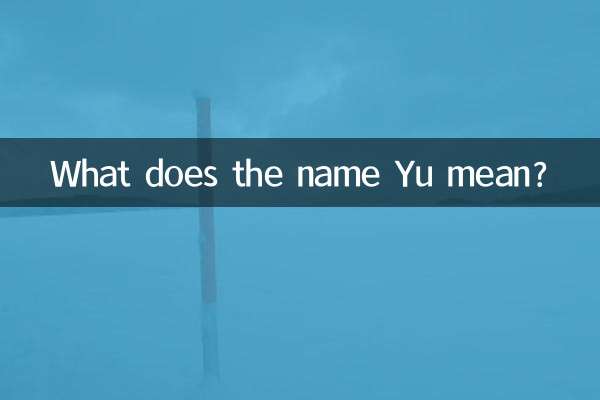Why is the fifth day of the lunar month called Po Wu?
In traditional Chinese culture, each day during the Spring Festival has its own unique customs and meanings. The fifth day of the first lunar month, commonly known as "Powu", is a very important day. So, why is the fifth day of the lunar month called "Powu"? This article will provide you with a detailed analysis of the origin and significance of "Broken Five" from multiple perspectives such as historical origins, folk customs, and modern hot topics.
1. The historical origin of “Broken Five”
The title "Po Wu" comes from ancient folk customs. According to historical records, the fifth day of the first lunar month is regarded as the "breaking day", which means that this day can break many taboos during the Spring Festival. The ancients believed that from New Year's Eve to the fifth day of the lunar month, it is not advisable to clean the home or use scissors to avoid "losing wealth" or "losing luck". On the fifth day of the lunar month, these taboos can be lifted, so it is called "breaking the fifth day".
In addition, the fifth day of the Lunar New Year is closely related to the custom of "giving away the poor". The ancients believed that garbage at home during the Spring Festival would accumulate "poor energy". On the fifth day of the Lunar New Year, the garbage should be cleared out, which means to send away poverty and welcome wealth.
2. The folk custom of "breaking five"
On the day of "Broken Five", there are different customs across the country. The following are some common folk activities:
| area | custom | Meaning |
|---|---|---|
| north | eat dumplings | It means "hold the villain's mouth" to avoid right and wrong for a year. |
| South | Offer sacrifices to the God of Wealth | Praying for good fortune in the New Year |
| Jiangsu and Zhejiang areas | Set off firecrackers | Drive away bad luck and welcome good luck |
| Guangdong | open market | The opening of shops symbolizes prosperous business in the New Year |
3. Modern Hot Topics and “Broken Five”
With the development of the times, the custom of "breaking five" is also constantly evolving. The following are the topics related to "Breaking Five" that have been hotly discussed across the Internet recently:
| topic | heat index | focus of discussion |
|---|---|---|
| “Broken Five” and environmental protection | ★★★★☆ | How to balance the traditional custom of setting off firecrackers with environmental protection |
| "Breaking Five" shopping craze | ★★★☆☆ | The impact of merchant promotions on the consumer market on the fifth day of the Lunar New Year |
| "Broken Five" food culture | ★★★☆☆ | The inheritance and innovation of "Po Wu" specialties from various places |
| “Breaking Five” and the Epidemic | ★★☆☆☆ | Adjustment and adaptation of the "breaking five" custom during the epidemic |
4. The cultural significance of “Breaking Five”
"Po Wu" is not only a traditional festival, but also a manifestation of the spirit of "saying goodbye to the old and welcoming the new" in Chinese culture. It symbolizes people's yearning for a better life and expectations for the new year. Whether it is eating dumplings, worshiping the God of Wealth, setting off firecrackers, or opening markets, these customs all express people's wishes to ward off evil spirits, avoid disasters, and attract wealth and blessings.
In contemporary society, the meaning of "breaking five" is more diverse. It is not only the inheritance of traditional culture, but also a part of modern life. For example, many young people share their ways of celebrating the "Broken Five" through social media, giving this traditional festival new vitality.
5. Conclusion
"Po Wu" is an important node in the Spring Festival, carrying rich cultural connotations and folk wisdom. From ancient times to the present, it has always been an important moment for Chinese people to bid farewell to the old year, welcome the new year, and pray for Najib. No matter how the times change, the spiritual core of "Broken Five" - to break the old shortcomings and welcome the new life - will continue forever.
I hope that through the introduction of this article, you can have a deeper understanding of "Why is the fifth day of the lunar month called Po Wu", and can better feel the charm of traditional Chinese culture in the future "Po Wu" festival.

check the details

check the details